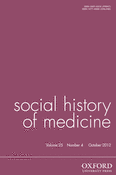-
Views
-
Cite
Cite
Nandini Bhattacharya, Narin Hassan, Diagnosing Empire: Women, Medical Knowledge, and Colonial Mobility, Social History of Medicine, Volume 25, Issue 4, October 2012, Pages 897–898, https://doi.org/10.1093/shm/hks065
Close - Share Icon Share
Extract
This book attempts to situate several travel narratives and ‘amateur’ medical practices by various British women from the seventeenth to the nineteenth centuries in Asia and Africa. The narrators are well known and often studied: from Lady Mary Wortley Montague and Emmeline Lott, to the late Victorian Emily Burton. By discussing their narratives together in this book the author wishes to ‘expose the centrality of domestic practices to the shaping of imperial medical culture’ (p. 4). In so doing, Hassan also attempts to demonstrate their written texts, which are the primary sources of her book, ‘as material objects that circulated .^.^. and established them as mobile subjects of colonial knowledge’ as well as ‘transferring information from the colonies back home and circulating between spaces themselves’ (p. 5). Here the author sets herself an ambitious and exciting task, but in the end, only partially convinces the reader.
The first chapter is devoted to Lady Mary Wortley Montagu's Turkish Embassy Letters. The author uses several quotations, particularly passages from the women's bathing scenes and approving descriptions of variolation, by Lady Mary, to argue that her unique position as a woman enabled her to provide both ethnographic accounts as well as transfer the knowledge of the Turkish practice of variolation back to Europe, where, the author argues, it helped the cause of vaccination. While this is an interesting anecdote and historical claim, the sparse evidence provided fails to convince the reader that a relatively obscure Turkish procedure aided the acceptance of vaccination in England to any great extent, or that it led the way, as Hassan says, to what ‘later became an organized, administrative health trend’ (p. 25). A historian will, moreover, be perplexed at representations of seventeenth-century Turkey by a British woman being described as ‘reorganiz[ing] the traditional dynamics of colonialism by challenging colonial representations’ (p. 25). It seems somewhat churlish to point out that Turkey was not a British colony, but more importantly there is a conceptual confusion in this book between Orientalist representations (and which is applicable to the abstract and constructed East) and colonialism.




